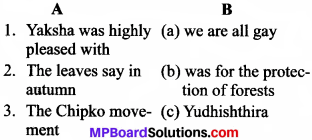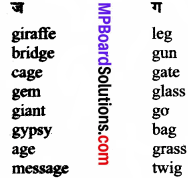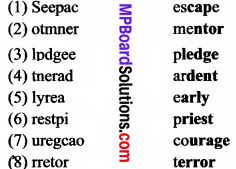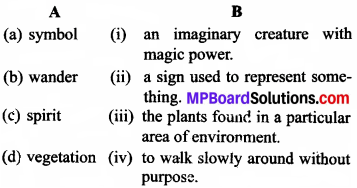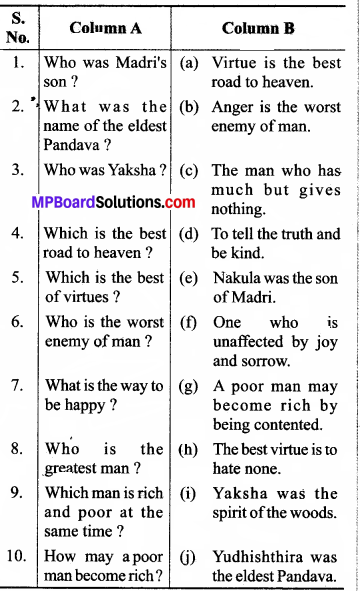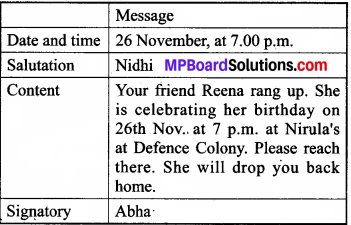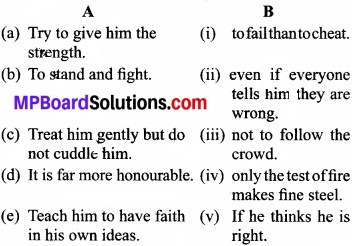Guys who are planning to learn the fundamentals of English can avail the handy study material using MP Board Solutions for Class 8 General English Practice Test Paper 1 Questions and Answers. You Can Download MP Board Class 8 English Solutions Questions and Answers, Notes, Summary, Guide, Pdf. Refer to the Madhya Pradesh State Board Solutions for English PDF available and score better grades. Simply click on the quick links available for MP Board Solutions for Class 8 General English Practice Test Paper 1 Questions and Answers and prepare all the concepts in it effectively. Take your preparation to the next level by availing the Madhya Pradesh State Board Solutions for Class 8 English prepared by subject experts.
MP Board Class 8th General English Solutions Practice Test Paper 1
Do you feel the concept of English is difficult to understand? Not anymore with our MP Board Solutions for Class 8 General English Practice Test Paper 1 Questions and Answers. All the Solutions are given to you with detailed explanation and you can enhance your subject knowledge. Use the Madhya Pradesh State Board Solutions for Class 8 English PDF for free of cost and prepare whenever you want.
Oral Examination
(मौखिक परीक्षा)।
1. Recite any one of the following poems:
(किसी एक कविता का पाठ करों:)
(a) Another chance.
(b) The Miser and his Gold.
Answer:
Do Yourself.
2. Read a paragraph from any one of the following lessons:
(निम्न पाठों में से किसी एक गद्यश को पढ़े:)
(a) Thrills of Kanha Kisli
(b) The Ungrateful Jeweller
(c) Trees : Our Saviours. Ans. Do Yourself.
Answer:
Do Yourself.
3. Listen to the given words carefully and write:
(दिये शब्दों को ध्यानपूर्वक सुनो:)
Answer:
Do Yourself.
4. Listen carefully and write:
(ध्यानपूर्वक सुनो और लिखो:)
Answer:
Do Yourself.
Written Examination
(लिखित परीक्षा ):
1. All questions are compulsory.
2. Write all the answers in English only
Question 1.
Do as directed
(निर्देशनुसार करें):
(i) Write words expressing the opposite gender for the given words:
(नीचे दिए शब्दों के विपरीत लिंग वाले शब्द लिखें:)
Madam, actor, man, horse.
Answer:
- madam – sir
- actor – actress
- man – woman
- horse – mare.
(ii) Fill in the blanks with appropriate articles (a, an, the):
(उचित आर्टिकल (a, an, the) से रिक्ता स्थान भरों:)
- I heard….. loud noise. It was of……. elephant.
- It is ….. best book available in ……… market.
Answer:
- a, an,
- the, the.
(iii) Write the comparative degree of the words given below:
(निचे देयो शब्दों की Comparative degree लिखो:)
- easy
- good
- small
- beautiful.
Answer:
- easier
- better
- smaller
- more beautiful.
(iv) Supply appropriate pronouns to complete the sentences:
(सही सर्वनाम से वक्या पूरा करों:)
Look at Reena. …………….. is studying. Mother and father have come to see ………….
Answer:
She, her.
(V) Supply correct form of the verbs.
(क्रियाओं को सही रूप दें:)
Answer:
- Rohit had reached before the doctor came.
- The robbers had run away before the police came.
(vi) Change the tense and rewrite the following sentences:
(काल बदलकर निम्न वाक्यों को पुन: लिखो:)
Answer:
- I lived in Bhopal.
- They had done their work.
Question 2.
(A) Match the following:
(निम्न का मिलान करों:)

Answer:
(1) → (C) tired
(2) → (d) jewellery
(3) → (b) thankless
(4) → (a) to set free
(B) Give one word for the following:
(निम्न के लिए एक शब्द दें:)!
- One who makes sculptures.
- One who saves others.
Answer:
- Sculptor
- Saviour.
(C) Write the antonyms of the following:
(निम्न शब्द के विलोम लिखो:)
- win
- end
- ugly
- wrong.
Answer:
- lose
- start
- beautiful
- right.
Question 3.
(A) Answer any five of the following questions in one or two sentences each:
(नीचे लिखे प्रश्नों में से किन्हीं पाँच के उत्तर एक या दो वाक्यों में दे:)
Question 1.
What is Kanha Kisli ?
(व्हॉट इज कान्हा किसली?)
कान्हा किसली क्या है ?
Answer:
Kanha Kisli is a beautiful National Park.
(कान्हा किसली इज अ ब्यूटीफुल नेशनल पार्क।)
कान्हा किसली एक सुन्दर राष्ट्रीय उद्यान है।
Question 2.
When did Kanha National Park come into existence?
(व्हेन डिड कान्हा नेशनल पार्क कम इन्ट्र एग्जिस्टेन्स ?)
यह कब बना ?
Answer:
Kanha National Park came into existence in 1955.
(कान्हा नेशनल पार्क केम इन्टू एग्जिस्टेन्स इन 19551)
यह 1955 में बना।
Question 3.
When could the woodcutter not earn any money ?
(व्हेन कुड द वुडकटर नॉट अर्न ऐनी मनी ?)
लकड़हारा कब पैसे नहीं कमा पाता था ?
Answer:
The woodcutter could not earn any money during the rainy season.
(द वुडकटर कुड नॉट अर्न ऐनी मनी ड्यूरिंग द रेनी सीजन।)
लकड़हारा बरसात के मौसम में कोई पैसे नहीं कमा पाता था।.
Question 4.
Who were trapped in the well?
(हू वर ट्रैप्ड इन द वैल ?)
कुएँ में कौन फंसे हुए थे ?
Answer:
A tiger, a monkey, a snake and a jeweler were trapped in the well.
(अ टाइगर, अ मंकी, अस्नेक एण्ड अ जुअलर वर ट्रैप्ड इन द वैल।)
एक बाघ, बन्दर, साँप और जौहरी कुएँ में फंसे हुए थे।
Question 5.
What did the villagers decide when the axe men refused to return ?
(व्हॉट डिड द विलेजर्स डिसाइड व्हेन द ऐक्समेन रिफ्यूज्ड टु रिटर्न ?)
गाँववासियों ने क्या निर्णय लिया जब कुल्हाड़ी धारियों ने लौटने से इन्कार कर दिया ?
Answer:
The villagers decided that they would not let the axes touch the trees at any cost.
(द विलेजर्स डिसाइडिड दैट दे वुड नॉट लैट द ऐक्सिज टच द ट्रीज ऐट ऐनी कॉस्ट।)
गाँववासियों ने यह तय किया कि वे किसी भी कीमत पर पेड़ों पर कुल्हाड़ी नहीं लगने देंगे।
Question 6.
What did the axe men do when the villagers hugged the trees and shouted “chipko, chipko”?
(व्हॉट डिड द ऐक्समेन डु व्हेन द विलेजर्स हग्ड द ट्रीज एण्ड शाउटिड “चिपको चिपको” ?)
कुल्हाड़ीधारियों ने क्या किया जब गाँववासियों ने पेड़ों को गले लगा लिया और “चिपको, चिपको” चिल्लाए ?
Answer:
The axe men were frightened and they ran away.
(द ऐक्समेन वर फ्राइटन्ड एण्ड दे रैन अवे।)
कुल्हाड़ीधारी डर गये और वे भाग गए।
(B) Answer any three of the following questions in three or four sentences each:
(नीचे लिखे प्रश्नों में से किन्हीं तीन के उत्तर 3-4 वाक्यों में दें:)
Question 1.
What attracts the tourists there ?
(व्हॉट अट्रैक्ट्स द टूरिस्ट्स देअर ?)
पर्यटकों को वहाँ क्या आकर्षित करता है ?
Answer:
Kanha Kisli’s wild life species attracts the tourists.
(कान्हा किसलीज वाइल्ड लाइफ स्पीशीज अट्रैक्ट्स द टूरिस्ट्स )
कान्हा किसली की जंगली प्रजातियाँ पर्यटकों को आकर्षित करती हैं।
Question 2.
How did the tiger, the monkey and the snake help the woodcutter ?
(हाउ डिड द टाइगर, द मंकी एण्ड द स्नेक हैल्प द वुडकटर ?)
बाघ, बन्दर और साँप ने लकड़हारे की कैसे मदद की ?
Answer:
The tiger once gave the woodcutter a set of gold ornaments, the monkey gave him sweet fruits one day when he was very hungry and the snake helped him in coming out of the prison.
(द टाइगर वन्स गेव द वुडकटर अ सैट ऑफ गोल्ड और्नामेन्ट्स, द मंकी गेव हिम स्वीट फ्रूट्स वन डे व्हेन ही वॉज वेरी हंगरी एण्ड द स्नेक हैल्प्ड हिम इन कमिंग आउट ऑफ द प्रिजन।)
बाघ ने एक दिन लकड़हारे को सोने के आभूषण दिये, बन्दर ने उसे मीठे फल दिये जब वह बहुत भूखा था और साँप ने उसे जेल से निकलवाने में मदद की।
Question 3.
What is the work of “Dasohli Gram Swarajya Mandal ?”
(व्हॉट इट द वर्क ऑफ “दसोहली ग्राम स्वराज्य मण्डल’)
“दसोहली ग्राम स्वराज्य मण्डल” का क्या कार्य है ?
Answer:
This organisation works to regenerate the degraded forests.
(दिस ऑर्गेनाइजेशन वर्क्स टु रीजनरेट द डिग्रेडिड फॉरेस्ट्स।)
ये संस्था उन जंगलों को नवजीवन प्रदान करने का कार्य करती है जिनका पतन हो गया है।
Question 4.
What else can be seen at Kanha besides animals?
(व्हाट ऐल्स कैन बी सीन ऐट कान्हा बिसाइड्स एनीमल्स।)
वहाँ और क्या देखा जा सकता है ?
Answer:
Natural Scenery, Jungle life and birds can be seen there besides animals.
(नैचुरल सीनरी, जंगल लाइफ एण्ड बर्डस कैन बी सीन देअर बिसाइड्स एनीमल्स।)
प्राकृतिक सौन्दर्य, जंगल की जिन्दगी, और पक्षी देखे जा सकते हैं।
(C) Answer any three of the following questions:
(किन्ही तीन प्रशनों के उत्तर दें:)
Question 1.
Why do we wish for another chance ?
(व्हाय डू वी विश फॉर एनदर चान्स ?)
हम एक और मौके की इच्छा क्यों करते हैं?
Answer:
We wish for another chance to change our failure into winning.
(वी विश फॉर एनदर चान्स टू चेंज आवर फेल्यर इन्टू विनिंग।)
हम एक और मौके की इच्छा इसलिए करते हैं ताकि हम अपनी हार को जीत में बदल सकें।
Question 2.
Why should we never give up in despair ?
(व्हॉय शुड वी नैवर गिव अप इन डिस्पेअर?)
हमें कभी निराश होकर क्यों नहीं छोड़ देना चाहिए?
Answer:
We should never give up in despair as there is always a tomorrow to start anew.
(वी शुड नैवर गिव अप इन डिस्पेअर ऐज़ देअर इज़ औलवेज़ अ टुमौरो टू स्टार्ट अन्यू) हमें निराश इसलिए नहीं होना चाहिए क्योंकि कल अवश्य आता है।
Question 3.
What was the only pleasure of the miser ?
(व्हॉट वॉज़ द ओन्ली प्लेज़र ऑफ द माइजर ?)
कंजूस का एकमात्र आनन्द क्या था ?
Answer:
His only pleasure was to see his treasure everyday.
(हिज ओन्ली प्लेज़र वॉज टु सी हिज़ ट्रेजर एवरीडे।)
उसे अपने खज़ाने को रोज देखने में आनन्द मिलता था।
Question 4.
What did the neighbors ask.the miser ?
(व्हॉट डिड द नेबर्स आस्क द माइज़र ?)
पड़ोसियों ने कंजूस से क्या पूछा ?
Answer:
The neighbors asked the miser what was the “matter.
(द नेबर्स आस्कड द माइजर व्हॉट वॉज द मैटर।)
पड़ोसियों ने कंजूस से पूछा कि मामला क्या था ?
Question 5.
Write any four lines of a poem you have read.
(Tots a fant ont ar viferrent feratii)
Answer:
Do yourself.
Question 6.
Read the passage given in the book carefully.
(A) Now answer the following questions.
(पुस्तक में दिए पद्यांश को ध्यानपूर्वक पढ़ें। अब निम्न प्रश्नों के उत्तर दें:)
1. Where did the hen lay the egg?
Answer:
The hen lay. the egg upon the roof of the farmhouse.
2. Who found the egg in the end ?
Answer:
A small mouse found the egg in the end.
3. Who did the hen ask about her egg ?
Answer:
The hen had asked the Goat, bird and a small mouse about her egg.
4. Why was the hen happy ?
Answer:
The hen was happy because she had got a baby chick in place of the egg.
5. What did the bird tell the hen about the egg?
Answer:
The bird told that the egg rolled along the drain pipe and them into a hole.
(B) Say true or false:
(सत्य या असत्य बताएँ:)
1. The egg rolled along the table.
2. The Goat and the hen lived in a farmhouse.
Answer:
1. True
2. True.
(C) Tick the correct answer:
(सही उत्तर चिह्नित करें:)
“If you look closely, you will see that you’ve a new baby chick in its place.” Here ‘closely means’
(i) nearly
(ii) carefully
(iii) quickly
(iv) rapidly.
Answer:
(ii) carefully.
(D) Write the past tense form of the following verbs with the help of the story:
(कहानी की सहायता से निम्न क्रियाओं के भूतकाल के रुप लिखें:)
1. fall
2. run.
Answer:
1. fell
2. ran.
Question 7.
Write an application to your class teacher requesting him to add your name in the list of the students going to the Kanha Kisli National Park.
(कान्हा किसली राष्ट्रीय पार्क जाने वाले विद्यार्थियों की सूची 1 में अपना नाम जोड़ने के लिए प्रार्थना करते हुए अपने कक्षाध्यापक को एक पत्र लिखें।)
Or (या)
Write a letter to your friend narrating your visit to Kanha Kisli.
(अपने मित्र को कान्हा किसली की सैर का वर्णन करते हुए एक पत्र लिखें।)
Answer:
10, Prabhu Nagar
Indore
20.3.20 ……..
Dear Mahesh,
Hope you are fine there. I am also fine here. As I had been to Kanha National Park in my vacations. I wish to share my experience with you. It was a great fun. We saw many animals like deer, elephants, lions, etc. We gave bananas to monkeys and elephants. We took photographs of beautiful birds and animals. We had our lunch there. We played some outdoor games and enjoyed a lot. I missed you a lot. Rest is fine.
(or)
Ram Pal Singh
26 / 102, Ashok Nagar,
Kanpur
4 – 3 – 20 …….
Dear Raj,
I am fine here and hope the same at your end 1. also. As our exams are over, what are your plans for your vacations. I am planning to go for a picnic to the Kanha Kisli National Park on 14th of this month. If you wish, you may also join us. Rest is fine. Pay my regards to elders and love to younger. Waiting for your letter,
Yours
Ramesh
Question 8.
Write an essay on any one of the following:
(निम्न में से किसी एक पर एक निबन्ध लिखें:)
- My School
- Importance of trees
- Independence Day celebration in your school.
Answer:
1. My School
I read in Senior Model School, Bhopal. It is situated in a peaceful environment as it is far from | the city. It has a red building with fifteen rooms. It has a big hall, a library, store room, games and sports room, clerks room and principal’s room. My school has a big play ground where cricket, hockey, football and other games are played. The name of my Principal is Mr. S.D. Sharma. He is a learned person.
There are 35 teachers in my school. All the teachers are well qualified The library of our school is well managed. We can read magazines and newspapers there. Annual functions are held in our school. There is a scheme of holding debate on every Saturday in my school. Sometimes picnics and tours are arranged in my school. All the children come in proper uniform to the school. I love my school very much.
कठिन शब्द –
- Peaceful environment = शान्त वातावरण
- situated = स्थित
- well qualified = सुयोग्य
- Debate = वाद – विवाद
- Magazines = पत्रिकाएँ
2. Importance of trees
We cannot imagine life without trees. Trees . are one of the most important creations of God. Trees are essential part of our lives. They help us in several ways. They produce oxygen in the presence of sunlight which is important for our survival and take in carbon di oxdie making the environment pure. We get wood from trees for making furniture, houses and paper. They provide us food to eat. Trees act as home for many animals and birds. Some trees have medicinal value like tulsi, neem, eucalyptus etc. Trees maintain the ecological balance of nature and bring rain through transpiration. They make the environment pollution free. So we should try our level best to preserve trees.
कठिन शब्द –
- essential = जरूरी
- environment = वातावरण
- ecological = स्थिति विज्ञान का
- balance = सन्तुलन
- Transpiration = वाष्पोत्सर्जन
- pollution = दूषित
- Preserve = रक्षा
3. Independence Day celebration in your school.
Celebrations In Your School Our country got freedom on 15th August, 1947. Britishers quieted India on this day. Therefore, this day is known as Independence Day. It is our National festival. It is celebrated all over India. In schools and colleges, it is celebrated with great pomp and show. It is celebrated in my school. The school building is decorated nicely. We reach school at 7 a.m. in proper uniform. Principal hoists the flag.
Then we all sing the national anthem. After that some, cultural programme is presented and then the teachers deliver speeches to teach us to be faithful to our country. In the end, the principal delivers a speech thanking the audience, teachers and the taught .We come back home with the laddoos given to us with the feeling of patriotism.
कठिन शब्द –
- quit= छोड़कर जाना
- pomp and show – = ठाठबाट
- national anthem = राष्ट्रीय गान
- patriotism = देशभक्ति
We wish the knowledge shared regarding MP Board Solutions for Class 8 General English Practice Test Paper 1 Questions and Answers has been helpful to you. If you need any further help feel free to ask us and we will get back to you with the possible solution. Bookmark our site to avail the latest updates on different state boards solutions in split seconds.

